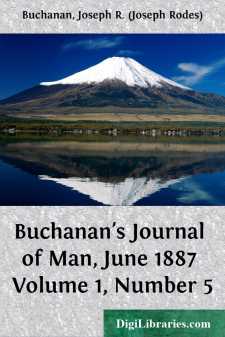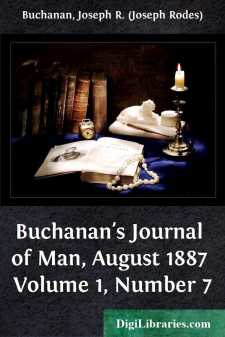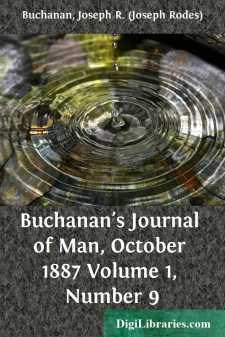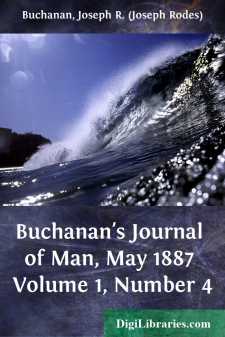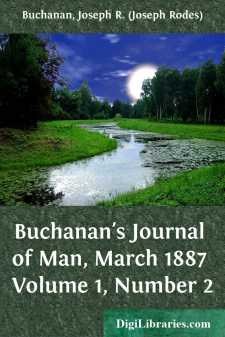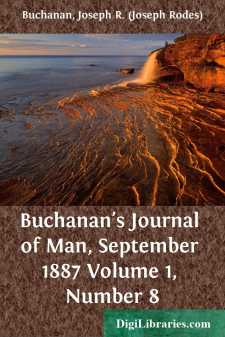Categories
- Antiques & Collectibles 13
- Architecture 36
- Art 48
- Bibles 22
- Biography & Autobiography 813
- Body, Mind & Spirit 142
- Business & Economics 28
- Children's Books 15
- Children's Fiction 12
- Computers 4
- Cooking 94
- Crafts & Hobbies 4
- Drama 346
- Education 46
- Family & Relationships 57
- Fiction 11829
- Games 19
- Gardening 17
- Health & Fitness 34
- History 1377
- House & Home 1
- Humor 147
- Juvenile Fiction 1873
- Juvenile Nonfiction 202
- Language Arts & Disciplines 88
- Law 16
- Literary Collections 686
- Literary Criticism 179
- Mathematics 13
- Medical 41
- Music 40
- Nature 179
- Non-Classifiable 1768
- Performing Arts 7
- Periodicals 1453
- Philosophy 64
- Photography 2
- Poetry 896
- Political Science 203
- Psychology 42
- Reference 154
- Religion 513
- Science 126
- Self-Help 84
- Social Science 81
- Sports & Recreation 34
- Study Aids 3
- Technology & Engineering 59
- Transportation 23
- Travel 463
- True Crime 29
Buchanan's Journal of Man, June 1887 Volume 1, Number 5
Categories:
Description:
Excerpt
The Most Marvellous Triumph of Educational Science.
In the dull atmosphere which stagnates between the high walls of colleges and churches wherein play the little eddies of fashionable literature, which considers the authorship of an old play more interesting and important than the questions that involve the welfare of all humanity or the destiny of a nation,—an atmosphere seldom stirred by the strong, pure breezes of the mountain and the ocean,—the best thought and impulse of which humanity is capable is stifled in its birth, or if it comes forth feels the overshadowing influence that chills its life.
Not there, amid the pedantries of “culture,” do we find the atmosphere for free and benevolent thought, but rather far away from such influences, in the forests, the mountain and prairie, where man comes more nearly into communion with nature, and forgets the inheritance of ancient error which every corporate institution preserves and perpetuates. It is to this widespread audience that the appeals and offers a new suggestion.
In sending forth the “New Education,” hoping for some appreciative response from educational circles in which collegiate influences prevail, I did not deem it prudent to introduce some of the noblest thoughts that belong to the great theme. The book was sent forth limited and incomplete, hoping that, heretical as it was, and quite irreverent toward the ignorance descended from antiquity, it might still receive sufficient approbation and appreciation to justify later introduction of matter that would have hindered its first reception.
It has reached the third edition, but it has been very apparent that its reception was cordial and enthusiastic only among the most progressive minds, the number of which increases as we travel westward, and San Francisco called for more copies than the leading cities of the East.
The time has now arrived (when this is hailed cordially throughout the country) that I may venture to announce the most remarkable feature of the art and science of education. There is an additional reason, too, for speaking out at this time, which should mortify the pride of an American citizen. The philanthropic science which I thought it imprudent to mention then in this free country, is beginning to be studied in France, where such themes are not suppressed by the sturdy dogmatism which is so prevalent and so powerful in the Anglo-Saxon race.
THE NEW METHOD IN FRANCE.
As the French National Scientific Association, in their meeting at Grenoble, two years ago, recognized in their most startling form the phenomena of human impressibility which are illustrated in the “Manual of Psychometry,” and reported the most marvellous experiments in medicines,—an act of liberality which has no parallel in English-speaking nations,—so at the late meeting of their Scientific Congress, as I learn from the German magazine, the , the new principle of education was broached which I feared to present in the “New Education,” and was received with general approbation by that learned body....


